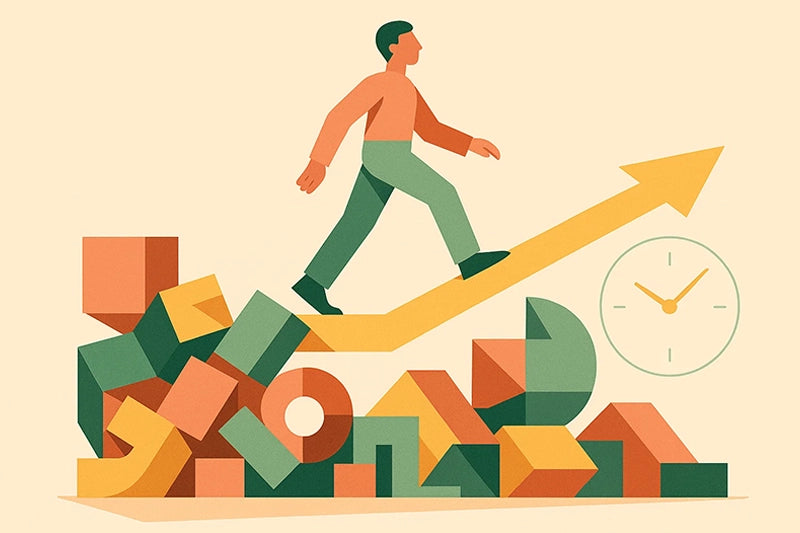Men today juggle demanding careers, family commitments and personal ambitions. It’s easy to think that staying late or constantly being “on” proves your dedication, but working extra hours rarely means getting more done. Productivity drops once you push past a standard 38–40-hour week, and regular overtime can increase stress, cut into recovery and hurt long-term health. The good news: you don’t need longer days to achieve more. Smarter work habits, based on how your brain and body function best, can help you stay productive within normal hours and keep life in balance.
This guide shares practical, research-backed strategies to help you focus on what matters, manage energy and structure your day for deep, meaningful work.
Prioritise What Matters
Many people confuse urgency with importance. Psychologists call this the “mere urgency effect” — we often choose quick tasks like clearing emails over higher-impact work. To break this cycle, use the Eisenhower Matrix:
-
Important & urgent: Deadlines and crises — act now.
-
Important & not urgent: Big projects and growth tasks — schedule these.
-
Urgent & not important: Interruptions and some emails — delegate or limit.
-
Neither: Time-wasters — cut them.
Start your day by sorting tasks into these quadrants so you can give prime energy to work that truly moves the needle.
Pair this with the Pareto principle (80/20 rule): 80% of results often come from 20% of efforts. Identify the few high-impact actions — the proposal that lands a client or the skill upgrade that moves your career forward — and do those first.
Manage Energy, Not Just Time
Time management matters, but energy drives output. Your body runs on natural peaks and dips in alertness (circadian and ultradian rhythms). Most people have a morning surge, a post-lunch dip and a late-day rebound. Studies show we work best in 90–120 minute focus cycles followed by short recovery breaks.
Work with these rhythms:
-
Track your peaks: Note when you feel sharpest for a week.
-
Do demanding work early: Reserve strategy and problem-solving for high energy.
-
Save admin for lows: Keep routine emails or forms for slower periods.
-
Sprint, then pause: 25–45 minute focus bursts with short breaks boost concentration and reduce fatigue.
-
Prioritise sleep: Seven to nine hours a night keeps mood and focus steady.
Your environment also matters: natural light boosts performance, while noise drains focus. Seek bright, quiet spaces when you can.
Stop Multitasking
Multitasking feels productive but drains efficiency. Each switch forces your brain to reset, which can cut productive time by up to 40%. Chronic multitaskers also struggle more with filtering distractions.
Instead, single-task:
-
Batch similar work: Group admin or emails into one block.
-
Silence notifications: Remove digital distractions.
-
Protect deep work: Set offline focus hours.
-
Finish before starting: Complete tasks fully before moving on.
Single-tasking may feel slower at first, but it produces higher-quality work in less time and with less mental fatigue.
Structure Your Day with Smart Scheduling
A clear schedule built around priorities and energy peaks keeps you focused. Time blocking assigns tasks to specific calendar slots so your day matches what matters most.
-
Plan weekly: Pick 2–3 big goals and break them into 25–90 minute blocks.
-
Match tasks to energy: Mornings for deep work; afternoons for lighter or creative tasks.
-
Add buffers: Leave 10–15 minutes between blocks to reset.
-
Stay flexible: Extend blocks if you’re in flow; move them if you’re stuck.
-
Review daily: Adjust based on what worked and what didn’t.
Protect peak hours from unnecessary meetings and keep some white space for unexpected work. A thoughtful schedule ends your day with progress, not exhaustion.
The Bottom Line
Working smarter isn’t about avoiding effort; it’s about using it wisely. Long hours erode productivity, health and personal time.
By focusing on high-impact tasks, managing your energy, ditching multitasking and structuring your day with intention, you can achieve more in a standard workweek while protecting your well-being. Start small — try the Eisenhower Matrix or block time for deep work this week — and build from there. Over time, you’ll produce better results, feel less burnt out and have more energy for what matters most.






